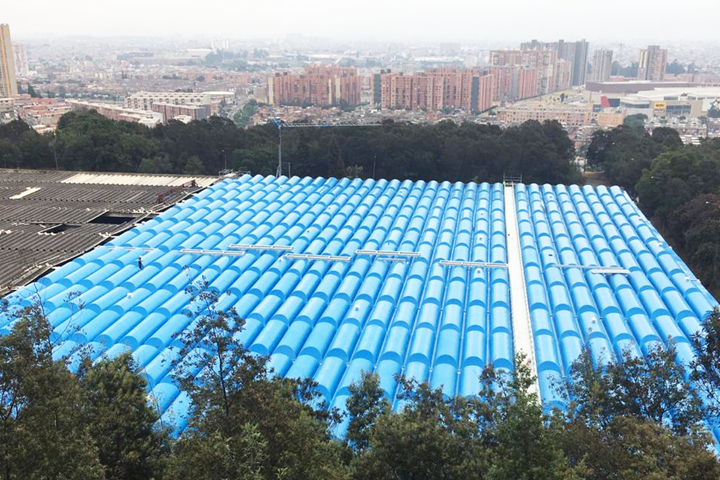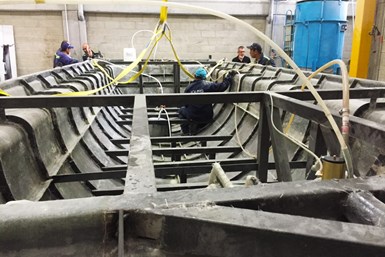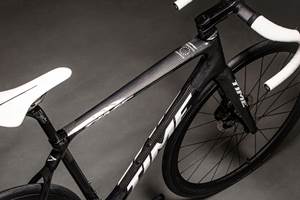Soling, Magnum Venus Products partnership produces LRTM composite domes
Incorporating the LRTM process enabled Soling to produce the largest LRTM part by volume manufactured in Colombia.

Aerial view of the completed phase one project to develop water storage tanks for Bogota Water Utility. Source | MVP
Magnum Venus Products (MVP, Knoxville, Tenn., U.S.) and its Colombian distributor, Minepro SAS (Medellin, Colombia) reported its collaboration with Innovative Engineering Solutions (Soling, Colombia), a company dedicated to providing corrosion solutions, to develop drinking water storage tanks for Bogota’s water utility company.
Soling was initially presented with the project in 2018 to develop a 143-meter-by-109-meter (149-foot-by-358-foot) drinking water storage tank, as the water utility company’s current operation had frequent aqueduct cover breaks requiring costly repairs and thus, increased risk of potable water contamination. Although Soling proposed a series of 7.6-meter-by-2.4-meter (25-foot-by-8-foot) semicircular domes, with a surface area of approximately 207 square feet per piece, it was soon realized that Soling would be required to manufacture 840 domes in order to cover the total project area. Partnering with MVP enabled both teams to devise an effective process to reach a high production throughput with very low post-processing requirements. Furthermore, Soling was already familiar with MVP, having relied on its equipment to provide solutions for its customers.
According to MVP, the Bogota Water Utility project required the manufacturing of up to eight 320- kilogram pieces per day, a net increase in consumption of more than two tons of resin per day. To meet the need for a highly repeatable process producing good surface finish with isophthalic gelcoat on both sides, MVP recommended vacuum-assisted closed molding, or light resin transfer molding (LRTM) as the most suitable process.
MVP used its Patriot Innovator High Volume RTM System which, designed for injecting polyester, vinyl ester and methacrylate resins and catalyst at controlled pressures, is capable of injecting material at a high rate with a single unit. The injection was performed with the LRTM process, consisting of high-volume turbo autosprue valves (TAS), universal couplings, seals and mold accessories. A low viscosity resin formulated by Colombian chemical manufacturer, Andercol Co. (Antioquia, Colombia), is said to have been incorporated.

Mold developed by Soling and MVP used in manufacture of new storage domes. Source | MVP
According to MVP, the full production cycle for one piece, from the preparation of the mold to the extraction of each dome, took four hours with an injection time of only 40 minutes. In an eight-hour work shift, two pieces were able to be manufactured from the application of gelcoat — using MVP’s multicolor gelcoat system — to the trimmed and finished piece, ready for shipment.
These new composite dome covers are expected to last much longer than those previously built with traditional materials, contends MVP, which were prone to breakage and carried huge maintenance costs for Bogota’s water utility company. The company notes that the success of this project has raised the bar on size, efficiency and production volume for the composites industry in Colombia.
To date, MVP says the Bogotá aqueduct domes are the largest parts by volume manufactured through a LRTM process in Colombia. The full implementation of the project is said to have taken only six months thanks to the collaborative effort between itself, Minepros SAS, Soling and Andercol; MVP’s team, including Latin America sales manager Andrés F. Collazos, and technical specialist Herik Navarro, provided critical equipment expertise and technical support. MVP’s distributor in Colombia, Minepro SAS, coordinated many of the engineering, sales and technical aspects during the process implementation, including equipment and fine-tuning of the LRTM process. On the materials side, Andrés Franco and the service and technical development team in R&D at Andercol, also played a key role in the formulation of the low-viscosity resin, as well as early support with key design elements of the process. Additionally, Soling’s engineering team, led by Rodrigo Vergara, was in charge of integrating all information and data, and setting up the process.
“Partners like MVP enable us to bring these projects to life and deliver effective solutions. Their customer service and technical expertise is second to none,” says Soling engineer, Javier Moreno.
“Through this collaboration, we were able to redefine what is possible for the local industry.” Soling says it is planning to continue producing covers for the second stage of the project and explore more MVP closed molding solutions for even higher manufacturing volumes of various large-scale composite parts.
Read the full case study here.
Related Content
Time Bicycles to modernize composite bicycle manufacturing
With the aid of KraussMaffei, Clemson University and SC Fraunhofer USA Alliance, Time anticipates a transition to HP-RTM for more efficient carbon fiber bike frame manufacture, plus a new facility in South Carolina.
Read MoreKraussMaffei and partners develop sustainable, safe and stylish children’s bike
The Lion Bike is a German-made, injection molded bicycle with 40% recycled carbon fibers with zero scrap and enabling 67% lower CO2 emissions during production.
Read MoreGlass fiber-reinforced Akulon RePurposed recyclate enables Ahrend sustainable office chair
Envalior 30% glass fiber-reinforced Akulon RePurposed material helps Ahrend achieve lighter task chair with closed-loop value chain and reduced emissions.
Read MoreLighter, stronger, faster bionic hand aided by composites design
Psyonic’s touch-sensing prosthetic hand leverages bionic technology, 3D printing and a carbon fiber composite exterior for light weight, high strength and high-tech functionality.
Read MoreRead Next
VIDEO: High-volume processing for fiberglass components
Cannon Ergos, a company specializing in high-ton presses and equipment for composites fabrication and plastics processing, displayed automotive and industrial components at CAMX 2024.
Read More“Structured air” TPS safeguards composite structures
Powered by an 85% air/15% pure polyimide aerogel, Blueshift’s novel material system protects structures during transient thermal events from -200°C to beyond 2400°C for rockets, battery boxes and more.
Read MoreAll-recycled, needle-punched nonwoven CFRP slashes carbon footprint of Formula 2 seat
Dallara and Tenowo collaborate to produce a race-ready Formula 2 seat using recycled carbon fiber, reducing CO2 emissions by 97.5% compared to virgin materials.
Read More


























